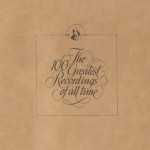
Composer: Béla Bartók, Sergei Prokofiev
Performer: Rudolf Serkin
Orchestra: Columbia Symphony Orchestra, Philadelphia Orchestra
Conductor: George Szell, Eugene Ormandy
Format: FLAC (tracks)
Label: Sony
Catalogue: G010001040005Q
Release: 2005
Size: 233 MB
Recovery: +3%
Scan: cover
Bartók: Piano Concerto No. 1, BB 91, Sz. 83
01. I. Allegro moderato – Allegro
02. II. Andante
03. III. Allegro molto
Prokofiev: Piano Concerto No. 4 in B flat major, Op. 53
04. I. Vivace
05. II. Andante
06. III. Moderato
07. IV. Vivace
Because Rudolf Serkin devoted most of his attention to Classical piano literature, strongly emphasizing Mozart and Beethoven, his performances of modern piano concertos are scarce. As a result of his selectivity, this CD of Bartók’s Piano Concerto No. 1 and Prokofiev’s Piano Concerto No. 4 is a rarity; this was the only Bartók concerto in Serkin’s repertoire, and he did not return often to the Prokofiev. Yet as unusual as these works were for Serkin, both concertos appealed to his intellect and his sense of clarity in expression, and each offered enough percussive passagework to suit his crisp style of playing. His sharp attack is pronounced in Bartók’s concerto, brought to the fore by the rather Spartan sound of the Columbia Symphony Orchestra, under George Szell’s direction. Additionally, the 1962 recording lacks resonance, and seems to exaggerate the piano’s spiky edge. Naturally, there is a much richer sound in the Prokofiev, partly due to the orchestration but most especially because Serkin is accompanied by the lush Philadelphia Orchestra, conducted by Eugene Ormandy. Though recorded in 1958, the sound is much fuller here, and Serkin’s tone seems more varied and shaded. As a historical record of Serkin’s interest in his contemporaries, this disc has value, but it may be hard for lay listeners to appreciate for its sound limitations.



